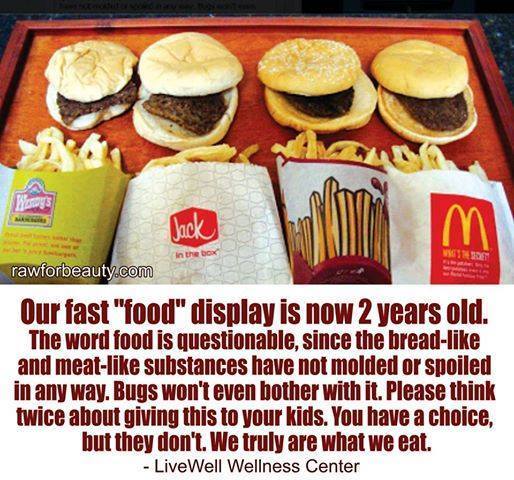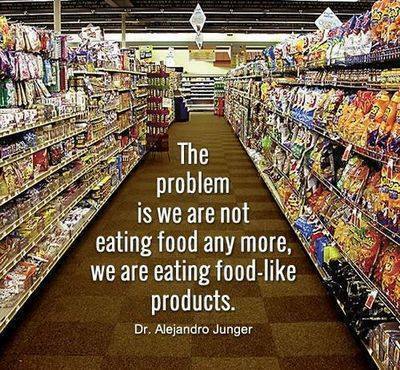Standard American Diet

he Standard American Diet, also known as SAD, is the typical meal plan of the United States that includes processed foods and monoculture ground provisions in three daily meals, for which there is no scientific basis. Food manufacturers influenced the eating habits of this country.There is little emphasis on the importance of vegetables and fruits in a healthy diet. Animal protein is considered the most essential part of breakfast, lunch, and dinner, supplied by industrial farm-raised protein that uses hormones to accelerate growth cycles, thereby increasing yields of red meats, poultry, pork, and dairy products. Processed meat contains high levels of sodium, sugars, saturated fats, and carcinogenic preservatives. Highly sweetened beverages are often used as water substitutes and are produced more effectively with high fructose corn syrup, a substance that can shut down the body’s built-in appetite regulator for fullness.
SAD contains little in whole grains, fruits and vegetables, fiber, healthy fats,and plant-based proteins, the natural foods that promote health in a human diet. Americans suffer from consistent consumption leads to diabetes, hypertension, heart issues, and obesity.
SAD foods are produced and packaged to reduce the amount of preparation time. Fast foods eliminate preparation time completely. However, the amounts of sodium, sugar, and fats have tipped the scales accounting for more than 20% of African Americans’ meals and a high obesity rate of 21%. Caucasian and Hispanic consumption is not too far behind.

Healthy and Unhealthy Aspects of the Standard American Diet
The only healthy aspect of the Standard American Diet is that it is filling, unfortunately, with products that minimally nourish the body. Vitamins and minerals, in many foods, are added AFTER processing. The refined flours, all in the interest of satisfying customer taste, are void of fiber and coat the intestinal walls, reducing nutritional absorption. A person could consume a lot of these foods and gain weight, but not benefit from the nutritional contents.
As these foods do not satisfy an appetite, more food is consumed and stored because the calorie content is unused. This results in obesity. One-third of U.S. adults are obese. With obesity comes chronic diseases of diabetes, heart disease, hypertension, and some cancers.Processed foods can affect the brain and contribute to inflammation and mood disorders. Addictive additives like sugar, fat, and salt, as well as combinations like umami or kettle flavor, are found in processed foods because they are desirable and can be habit-forming. Corporations appreciate these tastes because consumers continue to eat and buy. Shareholders appreciate their dividends.
Dr. Joseph Mercola wrote "Ultraprocessed foods are not just "convenience foods." They’re industrial products like sodas, chips, packaged soups, chicken nuggets, and diet soft drinks — engineered with additives, preservatives, flavor enhancers, and unhealthy fats your body wasn’t meant to process. These ingredients do more than expand shelf life; they alter how nutrients are absorbed, generate toxic byproducts during processing, and introduce harmful chemicals from packaging into your system.
That combination sets the stage for inflammation, immune dysfunction, and ultimately, cancer. Understanding this link between food and lung cancer risk changes the conversation. It’s not only about smoking anymore — it’s about what you put on your plate. To see how this risk unfolds in the data, let’s look at what the researchers discovered in their analysis." 1

Standard American Diet Worldwide

McDonald's and Burger King were in Hong Kong and Japan when I visited with an on-site sketch tour in 1984, and in the United Kingdom when I was there in 1992. Food corporations expanded their presence worldwide, spreading obesity and chronic diseases. The desire to emulate the United States is propaganda to convince people to surrender their native diets, which have kept them healthy and fit for generations, for a hamburger comprised of more than one carcass from as far away as South America, where grazing pastures replace the Rain Forest. Shifting to fast food benefit corporations. People reduced preparation time for their minds and bodies. The time saved from purchasing and consuming prepared meals benefits businesses.

Consequences of the Standard American Diet in Foreign Countries

When immigrants come to the United States, they are attracted to the SAD as are Americans. They like the quantities and the prices, however,they suffer from inadequate nutrition as Americans do. Processed foods cost less per unit than organic produce or first number 4, conventionally grown with pesticides.Dollars are stretched further with packaged products. Packaged goods last longer and are less prone to spoilage than fresh produce. These are ideal products to ship to countries that have limited infrastructure.
Food corporation are embedded with the federal government. This relationship guarantees providing meals for military bases of the Department of Defense's deployments in foreign countries. The corporate tentacles stretch to attract potential markets. The same refined processed foods that increased heart disease, stroke and type 2 diabetes in Americans, change the eating habits and health of people who now have the choice of eating cellophane covered snacks versus their locally prepared seasonal dishes.
 The no. 3 is another (first number) designation for conventionally grown.
The no. 3 is another (first number) designation for conventionally grown.Law and the Standard American Diet
I became aware of Dodge v. Ford, a law that will unlikely change the relationship between public corporations and shareholders in 2025. People buy shares in corporations when an initial public offering (IPO) is made. The corporation receives additional capital to expand its operations, produce more products, and generate increased revenue. The shareholders receive dividends, capital earnings on their investment in the corporation that makes the choice of the investment appear sound. Therefore, the investor will continue to invest in the corporation.

From LegalWires:
"Under Henry Ford’s direction, the Ford Motor Company (defendant) had experienced expansion and success. Despite lowering the prices of cars, Ford’s profits increased, leading to substantial special dividends paid out to shareholders, The Dodge brothers, who had a minority investment in Ford and operated their own auto company, were among the owners who received significant special dividends from Ford.
"Henry Ford declared in 1916 that he would no longer be paying special dividends, choosing to put his future profits in growing the business, bringing down car prices, and creating jobs. The Dodge brothers protested this new policy, claiming that Ford’s new course was not in the best interests of the stockholders and that it was their right as owners to receive these dividends.
"The dispute escalated when Ford decided to invest in a smelting plant, further indicating a shift from dividend payments to reinvestment. The Dodge brothers filed suit, seeking to reinstate special dividends and prevent the construction of the smelting plant. The lower court ruled in favor of the Dodge brothers, ordering Ford to pay a special dividend and enjoining the construction of the smelting plant. Ford appealed the decision, leading to this case being heard by the Supreme Court of Michigan." 2

Question detail by Allison L. Williams Hill
Decision of the Supreme Court
"The 1919 Michigan Supreme Court affirmed the lower court’s decision regarding the payment of dividends but reversed the decision enjoining Ford from building the smelting plant. The court held that while shareholders have rights to dividends from corporate profits, directors also have broad discretion to use those profits for lawful business expansion efforts deemed beneficial for the company’s future. The court also noted the business judgment rule, which gave Ford a wide mapping on how to run the company.
"Court held on several points that, Directors and Authorities of a company have a fiduciary duty to act in the best interests of shareholders. This duty requires them to prioritize maximizing shareholder value within legal constraints. The court emphasized that while corporations can engage in charitable activities or pay fair wages to employees, these activities should not compromise the corporation’s ability to pay reasonable dividends to its shareholders.
"The court clarified that the primary purpose of a corporation is to generate profit for its shareholders, and any actions taken by directors must be in line with this purpose. Decisions that prioritize other interests, such as charitable contributions, must not conflict with this fundamental duty." 3

The judgment by the court favored the owners, the CEO and shareholders, over the employees. The Dodge brothers probably used their dividends to fund their own car and truck corporation.The revenue generated by Ford Motor Company would have prolonged their plans if Ford had been successful in contri- buting to his employees.All food corporations have the obligation to "feed" their shareholders, who are also their co-owners.
They decide what anyone else receives because they are the investors and developers. This applies to all food businesses that feed the people of the United States and the world. What matters is that people purchase the products as long as they taste good, regardless of whether they are healthy or not. Food corporations prioritize profit by providing what people desire in terms of tastes, cravings, and convenience, regardless of health considerations. No one will eat the food if it doesn't taste good. The corporations will invest the least amount of materials, maintain low production costs to realize the highest and most significant return on that investment. Fresh foods spoil and require a higher turnover. Preservatives ensure a higher shelf life, contributing to greater profits.That makes shareholders happy. In the meantime, people consuming these products become ill, imbalanced, and prime customers for the pharmaceutical industry.
"As of 2022, in Delaware, the jurisdiction where over half of all U.S. public companies are domiciled, share-holder primacy is still upheld.[4][5] Under some interpretations, the case also affirmed that the business judgment rule that directors may exercise is expansive, leaving Ford and other businesses a wide latitude about how to run the company, if management decisions can point to any rational link to benefiting the corporation as a whole." 4
There is a growing segment of companies focused on health and sustainability (like organic brands). Still, they represent a small share of the total market and may be acquired by larger conglomerates. However, When these companies merge into corporate groups, formulas may be revised to include lower-quality substances.The corporation will adjust the unit price and quantity to maintain the profit margin.
And in 2011, the Catholic Church secretly approved of GMOs.Is the Catholic Church a corporate investor or recipient?

Options to the Standard American Diet
If the desire is for tasty, addictive fare, keep giving your money to corporations only interested in showering their stockholders and their administration with money. The Standard American Diet can be abandoned. The change can be done gradually.If the Standard American Diet was abandoned, people would recover from:
• Heart disease
• Type 2 diabetes
• Autoimmune disorders
• Obesity-related cancers, and Obesity, or adipose tumors, itself! People would slim down, become healthier, move more, and be happier.
Return to or adopt traditional diets that include natural vegetable and fruit combinations with decades of proof of supporting vitality.Traditional diets from one's own culture and from other cultures could be explored. What was healthy that MOM created or what could BE MADE healthy, is something to explore.If people are fortunate and their parents are still with them, share with Mom what is being considered. Share the change in a way that expresses concern for the parents' health and explore ways together about how to make traditional dishes healthier.
Enslaved Black people were given waste entrails of animals enslaving persons consumed.The enslaved ate waste.People prepared pork intestines, stomachs, ears,hooves, and snouts by trial and error, many collected waste in the body of the animal, to survive. They became delicacies known as Soul Food. Many Black people eat them today in honor of our ancestors. Our economic status has generally improved so the preparation and consumption of these products are no longer needed. We can love and honor our ancestors for intelligently addressing heinous conditions, however, what was consumed is impacting our lives as proven in studies we have available now. Letting these substances go does not dishonor our fore bearers.
SAD encourages an addictive cycle by eating good tasting, readily available foods frequently. Instead, use:
• Seasonal vegetables and fruits
• Whole grains
• Grass-fed or free-range meats or
Transition into eliminating all terrestrial and marine meats. They contain the same thing vegetables, fruits, and grains contain: Amino acids which was the reason for consuming them in the first place. Gary Null has a nice saying: if it has a face, don't eat it.
Homemade meals will have fewer chemicals, in the forms of preservatives if the foods are fresh but it depends on what ingredients you use.

Use recipes with fresh ingredients. Read about other cultures and dining. Plan for the preparation and plan for the consumption with family and friends. Make time to dine.
What is odd is that there are what are called "food forests" where there are large areas without access to commercial food shopping. Corporations are more concerned with losing revenue in areas they perceive to susceptible to theft, ruining their bottom line. Stores disappear along well-traveled commuter routes near subway and surface transit.
People
have fewer options that cost greater resulting in less products. Sales
at small grocery stores focus on highly preserved foods. Fresh
vegetables and fruits are generally priced higher because of what their sources charge, adequate, and limited storage capacity.

The Standard American Diet and the Environment
It is important to cover chemtrails and the Standard American Diet. In addition to pesticides and preservatives added in the monoagriculturaL cycle of food production, chemtrails are another contaminant to American foods.

Chemtrails on the Sea by Allison L. Williams Hill
Chemtrails are affecting food supplies. The proof would be evident IF soils and the products from them are tested.The substances are sprayed in patterns above inhabited areas. They are not exhaust trails from aircraft.Contrails disintegrate in a matter of minutes. Chemtrails are suspended for days. Special interests support scientists who state that “chemtrails” are condensation trails from aircraft. There are visibly two types and no explanation is offered for the difference in appearance.Geoengineeringwatch.org tested rain after a chemtrail spraying and found aluminum, barium, and strontium contained in the residue. Blood, and after the COVID-19 debacle, others reported that graphene oxide was found in the residue. That must be substantiated.
These substances descend onto our bodies, vehicles, homes, properties, on and into flora, the trees on which we depend, into soil,and then into crops. Americans, and now people worldwide, have been consuming these substances since the 1990s. Be conscious of your health after you see these forms and after rains. Include meteorological weather information, sunrise and sunset, and moon rise and moon set for each day. Document the sky's conditions. Record chemtrails, day and night. Spraying is not limited to the daytime. Keep a record of your physical, mental, and emotional health. 5
If you are concerned about environmental contaminants in food,look into soil health studies and air quality research locally and regionally. Visit credible watchdog groups such as:
• The Environmental Working Group (EWG)
• Institute for Responsible Technology
• Organic Consumers Association
You can also submit a Freedom of Information Act (FOIA) requests or follow environmental advocacy reports for more transparency. Diet affects every aspect of existence - physical, mental, and emotional health.
Informative documentaries show the history of the food industry and its impacts on humans as well as the animals humans consume. For more information:
Documentaries:
Forks Over Knives,
That Sugar Film
The Magic Pill
Food, Inc.
7 Steps to Perfect Health and other DVDs at Gary Null's Vitamin Closet
The Animals Film
Books:
The Omnivore’s Dilemma by Michael Pollan
Salt Sugar Fat by Michael Moss
Fast Food Nation by Eric Schlosser
All of Gary Null, Ph.D.'s books at Gary Null's Vitamin's Closet
Gary Null's health articles at Gary Null.com
Join and support organizations focused on improving our condition:
Center for Science in the Public Interest (CSPI)
Environmental Working Group (EWG)
Physicians Committee for Responsible Medicine (PCRM)
Geoengineering Watch
Institute for Integrative Nutrition
The Progressive Radio Network
Join your people - friends, family, and/or associates. Have discussions about what was learned and provide proof of the effects of foods subjected to questionable practices.
You can also:
1. Stop eating it. Vote with your money. Leave the interior food displays alone. That is where SAD foods are displayed. Shop the perimeters where fresh fruits and vegetables are displayed. Frozen is good, but fresh is best.
2. Pursue changes in agricultural and food policy.
3. Simultaneously, grow your own. I would suggest indoors or in covered areas.
Resources
1.Processed Food Diet Raises Lung Cancer Risk
2. LegalWires, Dodge v. Ford , 1916
4 . Ditto
5. Where Can I Have My Soil Tested Near Me? – Find The Best Labs
Links

The above meditation mandala will be available soon.














